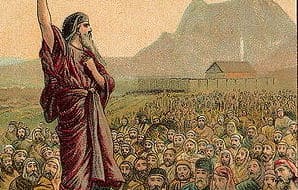 Parshat Va’etchanan (Deuteronomy 3:23–7:11) — Moshe’s prayer to G-d gives us insights into prayer, our relationship with G-d and the land of Israel. We also look at the Temple and its eternal impact on the Jewish people and the world.
Parshat Va’etchanan (Deuteronomy 3:23–7:11) — Moshe’s prayer to G-d gives us insights into prayer, our relationship with G-d and the land of Israel. We also look at the Temple and its eternal impact on the Jewish people and the world.
Shorashim study and Overview
Moshe reminds the people about his plaintive almost painful prayers to be allowed into the land of Israel
Why would he do that?
He says, “Pray let me cross over and see the good land that is on the other side of the Jordan, this good mountain and the Lebanon.”
What is the good mountain and what is Lebanon?
How do we know that?
Moshe also says, “But the Lord was angry with me because of you, and He did not listen to me, and the Lord said to me, “It is enough for you; speak to Me no more regarding this matter.” Except the word translated “because of you” is LiMaanChem which really translates as ” for your sake”.
What is the deeper implication of the original Hebrew?
G-d refuses Moshe’s demand and instead tells him to ascend a mountain and see the Promised Land from the north to the south and the west to the East. Our sages tell us that what he saw was not just the physical land but rather its unfolding history and destiny
Look up the targum of Yonatan ben Uziel and see which recent events were prophecied in that viewing.
Moshe then continues to review the past and describes the Exodus from Egypt and the Giving of the Torah,
How is Moshe’s rendition of the Ten Statements or the Ten Commandments different from what we read in Exodus and why is there a difference?
Moshe makes a dramatic statement that will prove to be the pillar of proof for Jewish understanding, learning and vision for generations. He says: “Has there ever occurred this great thing, or has the likes of it ever been heard? Did ever a people hear the voice of G-d speaking out of the midst of the fire . . . and live? . . . You were shown, to know, that the L-rd is G-d . . . there is none else beside Him.”
What makes those statements so critical?
Moshe also describes the words of the Shma Yisrael prayer, one of the most cardinal prayers in Jewish life wherein a Jew at least twice a day takes upon himself the yoke of G-d’s majesty, proclaims His unalterable Oneness and about our unending love for G-d and just as critically our commitment to transfer that belief and love to our children. We also reconnect to the commandments of the mezuzah represnting the sanctification of our homes and the tefilin, the phylacteries which represent the sanctification of our actions and of our being bound up with G-d in an act of betrothal.
How so ?
Moshe ends the chapter describing visions of future exiles and the final redemption.
Listen to this week’s podcast